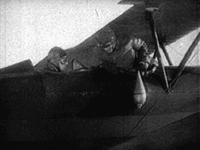| The Journal of Provincial Thought |
|
 |
|||||||||||
| SO WHAT DID HAPPEN TO AMELIA EARHART? Carlos "Nosy" Quiznoe |
||||||||||||
 |
||||||||||||
| The mystery of Amelia Earhart’s disappearance during a round-the-world flight on July 2, 1937, has fascinated Americans for nearly 70 years.1 Her tale combines elements of hero-worship, feminist hagiography, spy story and tragic survival narrative. | ||||||||||||
|
As with many such unsolved historical mysteries, various paranoid conspiracy theories have sprung up to magnify further Earhart’s heroic-mythic stature. She and copilot/radio operator Captain Fred Noonan have entered the honor roll of people best known for vanishing without a trace—like Judge Crater, Ambrose Bierce or D.B. Cooper. If definitive evidence of her fate, along with Noonan and her Lockheed Electra monoplane, is ever found, our imaginative lives will be the poorer for it.
Red River Dave McEnery’s country ballad on the tragedy is in a long tradition of disaster songs (steamboat explosions, train wrecks, mine collapses) that fuel folk traditions. It appeared after the news of the disappearance and was popular around the time of the 1939 The first verse of McEnery's "Amelia Earhart's Last Flight" has Earhart and co-pilot Captain Noonan "out on the ocean, just a speck against the sky" before they "fell in the ocean, far away." The chorus is a farewell that speaks of "happy landings" on "a beautiful, beautiful field far away in a land that is fair." Earhart is given the title "first lady of the air." The second verse steps back to a moment in which Earhart radios that things are going well despite the need to refuel the monoplane soon on Howland Island. In the third verse, however, "a half an hour later" a weak SOS is received, though "still her voice was brave." Earhart meets her fate in the "shark-infested waters" of a Pacific night. The fourth verse calls for Amelia's safe return (notwithstanding the just-delevered pronouncement of her demise) and correctly predicts that "We'll ne'er forget Amelia and her plane." Not that McEnery was so much into the Earhart stir. He wrote the song in a few minutes one afternoon to have something to perform that night. The World's Fair broadcast? McEnery just happened to be handy when ABC was ready to send. #### ____________________________ 1 Apparently, there have been at least three years during which Americans were perhaps only mildly indifferent--ed. |
||||||||||||
|
||||||||||||
| Copyright 2010- WJ Schafer & WC Smith - All Rights Reserved | ||||||||||||
